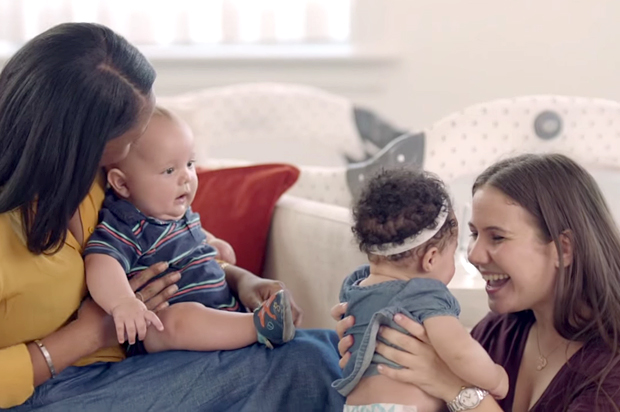When a brand is going to do what brands do — try to sell you a product — it’s terrific when the company attempts to do it in a way that’s at least smart and sensitive to its customers. But to quote Mindy Kaling, “I just sometimes get the sneaking suspicion that corporations are co-opting ‘girl confidence’ language to rally girls into buying body wash.” Or plus-sized clothing. Or maybe in this case, baby formula.
Last winter, formula maker Similac made a splash with a spot entitled “Mother ‘Hood,” a sendup of extreme baby mama clichés — power suit-wearing working moms, yoga moms, dolphin-assisted water birth moms, and of course, “nipple police” and “too lazy to breastfeed” moms — ready to come to blows until they unite together over the idea that “Whatever our beliefs, we are parents first. Welcome to the sisterhood of motherhood.” The ad received immediate acclaim as “perfect” and “honest.” Now, Similac brand director Misha Pardubicka-Jenkins says that “We knew that we wanted to continue the conversation and nail down what was really going on with moms,” so the company enlisted Cynthia Wade — the Oscar winning documentary maker behind “Freeheld” — to create a seven and a half minute film to “#EndMommyWars.”
The unscripted short claims that “95% of moms say they feel judged,” which suggests to me that 5 percent of moms are just not paying attention. Good for you, Gwyneths! And the film does a perfectly fine job of depicting the struggles and trade-offs of real world motherhood. Of course, 16 seconds in, the first mother to talk about breastfeeding chimes in, saying, “I think I’m desensitized, almost, because people talk about whether I breast feed or bottle feed so much.”
As it progresses, one working mom is shown breastfeeding at home and pumping at work. Another mother, whose twins were preemies, talks about how people will see her feeding with a bottle and say, “That’s breast milk, right?” She admits, “It’s almost a conversation that you have to have with a stranger.” There’s a working single mother. A mother who has gone through multiple pregnancy losses and a lumpectomy. There’s one who “had my little girl in tutus” and put her son in little bow ties. There’s another who “wanted to raise a gender neutral child.” In the end, the women meet and confess their preconceptions about each other — sometimes tearfully — before bonding with each other and their babies.
Pardubicka-Jenkins tells AdWeek, “How parents feed their babies is a very personal decision, but the mommy wars have opened the topic up for public debate. We want to transform mommy wars into mommy support by changing the conversation.” To be fair, a lot of that comes from a well-intentioned and well-executed place. The moms in the film clearly represent a diverse array of experiences and circumstances. And any woman who has children will likely relate to the endless parade of judgment that we’re constantly subject to — and yes, sometimes also participate in.
Yet the film is a cautious work. There don’t appear to be any adoptive moms, let alone adoptive dads. Both of the moms shown working outside the home express obvious guilt and a sense of obligation. “If not going back to work were something I could do, absolutely do it. I’d stay home with her,” says mom Shyrelle. (Psst, some moms like working.) There are zero men depicted at all. Instead, the subtle message underlying the story is that women make hard choices — including, have we mentioned? using formula.
I get that this campaign is aimed at a particular audience — the concerned mom who’s very aware of the scrutiny she faces. But what if we could now move from a place of not using baby talk like “Mommy wars” when we as adults are discussing the lives of our fellow adults? Can we say that if you did not come out of a particular woman’s birth canal, calling her “Mommy” can actually sound belittling? Can we go further, and admit that enduring previous surgeries, or having preemies, or crying in the elevator as you drop your baby off on your way to work should not be what’s required of women to justify how they feed their babies? And can we also, anywhere in this entire conversation, note that fathers — both gay and straight, both partnered and single — also participate in nourishing their babies and that process can involve bottles?
I am obviously not in the advertising business, because no one wants to green-light my ad campaign that runs on the motto, “Because mind your own f__king business, that’s why.” And it’s cool to see brands moving away from the perfect fuzzy ideal that having babies is some lullaby-themed perfect dream. But let’s not forget that Similac is still in the business of selling you baby formula. (You can see one of the moms from the film elsewhere on Similac’s YouTube channel, doing a more straightforward endorsement of the product.) And if you really want to end the vomitously named “mommy wars,” you could start by not perpetuating the concept.


